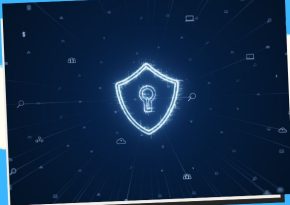
Embracing Security Shields: Safeguarding Digital Ventures in the Cyber Era
Discover the power of embracing cybersecurity as a shield for your digital ventures. Explore how this essential practice ensures your journey is fortified against modern cyber threats.
The Vital Embrace of Cybersecurity: Safeguarding Your Digital Ventures 


In today’s rapidly evolving digital landscape, where small business owners, internet marketers, social media sellers, parents, and professionals all play significant roles, the importance of cybersecurity cannot be overstated.
As we navigate an interconnected world, our reliance on technology has grown exponentially. From managing small businesses to networking on social media, from parenting in the digital age to conducting professional endeavors online, the digital realm has woven itself into the fabric of our daily lives. However, with this integration comes the pressing need to fortify our virtual assets against an ever-evolving array of cyber threats.
Understanding the Cybersecurity Landscape
The cybersecurity landscape is a dynamic arena characterized by constant innovation, both on the side of malicious actors and defenders. Cybercriminals employ tactics ranging from phishing attacks and ransomware to data breaches, while cybersecurity professionals work tirelessly to counter these threats. This dance of innovation underscores the need for everyone, from small business owners to parents, to have a fundamental grasp of cybersecurity principles.
Small Business Owners: Guarding Your Ventures
For small business owners, the stakes are high. In an age where a significant portion of commerce takes place online, the susceptibility to cyber threats can cripple even the most promising ventures. Cyberattacks can lead to data breaches, financial loss, and reputational damage that may take years to recover from. Implementing robust cybersecurity measures can safeguard customer data, protect financial transactions, and foster trust among clients. By adopting encryption protocols, regular software updates, and employee training programs, small business owners can erect a digital shield against potential threats.
Internet Marketers and Social Media Sellers: Preserving Online Relevance
Internet marketers and social media sellers thrive in the digital realm, utilizing various platforms to engage with customers and promote their products. The value of maintaining a secure online presence cannot be overstated. A security breach could not only compromise sensitive business data but also erode the trust of followers and customers. Utilizing strong, unique passwords, enabling two-factor authentication, and being wary of phishing attempts are essential practices. By prioritizing cybersecurity, these professionals can maintain their online relevance while safeguarding their reputation.
Parents: Navigating the Digital Frontier
In an age where children are digital natives, parents face unique challenges. Ensuring their safety in the online world requires a combination of education and technological oversight. Cyberbullying, inappropriate content, and online predators pose real risks. By establishing open lines of communication with children, educating them about responsible online behavior, and using parental control software, parents can create a safe digital environment for their children to explore and learn. 
Professionals: Defending Digital Workspaces
Professionals operating in various industries often store sensitive information on digital platforms. From healthcare records to financial data, safeguarding these assets is paramount. The rise of remote work has also introduced new vulnerabilities, as personal devices become access points to corporate networks. Professionals can bolster their cybersecurity posture by using virtual private networks (VPNs) for secure remote access, encrypting sensitive communications, and undergoing regular security training. This proactive approach ensures that personal and professional data remains out of the reach of cybercriminals.
 Benefits of Embracing Security Shields in the Cyber Era
Benefits of Embracing Security Shields in the Cyber Era
- Enhanced Data Protection
Security shields provide robust encryption and authentication protocols to safeguard sensitive business and personal data from unauthorized access. - Reduced Risk of Cyberattacks
By implementing strong security measures, businesses reduce the likelihood of falling victim to cyberattacks such as malware, ransomware, and phishing. - Regulatory Compliance
Digital ventures, particularly in industries like finance and healthcare, are often required to comply with stringent data protection regulations such as GDPR. Security shields ensure compliance. - Improved Customer Trust
When customers feel confident that their data is secure, they are more likely to trust the business, leading to better retention and loyalty. - Business Continuity
By mitigating risks, businesses can avoid the downtime and disruption that comes with data breaches and cyber incidents. - Better Risk Management
Security shields allow businesses to identify and assess potential vulnerabilities in their systems, reducing the impact of possible threats. - Safeguarded Intellectual Property
Protecting proprietary information such as product designs, trademarks, and source code ensures that intellectual property remains secure and free from theft. - Preventing Financial Losses
Cyberattacks can result in hefty fines, legal fees, and the loss of revenue. With robust security shields, businesses can avoid such financial pitfalls. - Operational Efficiency
A secure infrastructure minimizes the need for reactive measures, allowing teams to focus on growing and innovating rather than fixing breaches. - Advanced Threat Detection
Security shields employ sophisticated algorithms to detect and respond to potential threats in real-time, preventing attacks before they can do harm.
 Pros and Cons of Security Shields in the Digital Era
Pros and Cons of Security Shields in the Digital Era
Pros:
- Reduced Cybersecurity Risks
Security measures help to mitigate the risks associated with online threats, from data theft to system crashes. - Comprehensive Threat Detection
Automated monitoring tools can detect and respond to attacks in real-time, providing a proactive approach to security. - Scalable Security
Security systems can be scaled to accommodate growing digital operations, ensuring that security is never compromised as the business expands. - Advanced Encryption Techniques
Encryption methods protect sensitive information, ensuring that even if a system is compromised, data remains secure. - Strong Authentication Protocols
Multi-factor authentication and biometric systems add layers of protection to access control, reducing unauthorized access.
Cons:
- High Implementation Costs
Initial investments for setting up a comprehensive cybersecurity infrastructure can be costly for businesses, especially for small enterprises. - Complex Management
As security measures become more sophisticated, the management and monitoring of multiple systems can become complex and resource-intensive. - Potential for False Positives
Security systems may occasionally flag legitimate actions as threats, leading to unnecessary disruptions and interruptions. - Dependence on Technology
Over-reliance on automated security measures may lead to complacency, with businesses neglecting the human element of cybersecurity, such as employee training. - Evolving Threat Landscape
As cyber threats evolve, security systems need continuous updates and improvements, making it challenging to maintain a fully secure environment.
 Case Studies: Real-World Applications of Cybersecurity Shields
Case Studies: Real-World Applications of Cybersecurity Shields
- Target Data Breach (2013)
Target’s massive data breach in 2013 highlighted the need for improved cybersecurity measures. After the breach, Target implemented better encryption techniques and security monitoring systems to prevent future incidents. - Equifax (2017)
Equifax’s data breach exposed sensitive personal data of over 147 million Americans. Following this, the company overhauled its security shields, investing heavily in automated monitoring and threat detection systems. - Sony PlayStation Network (2011)
In 2011, Sony’s PlayStation Network was hacked, affecting millions of users. Post-breach, Sony implemented advanced security protocols, including encryption and real-time intrusion detection systems. - Yahoo Data Breach (2013-2014)
Yahoo’s security failures affected billions of user accounts. The company introduced enhanced security shields by integrating multi-factor authentication and security patch management systems. - Facebook’s Privacy Scandal (2018)
In response to the privacy breach involving user data, Facebook strengthened its data protection mechanisms by incorporating end-to-end encryption and rigorous access controls. - Ransomware Attack on NHS (2017)
The National Health Service (NHS) in the UK faced a major ransomware attack. This prompted the NHS to increase its cybersecurity budgets, introducing continuous network monitoring and rapid response systems. - Amazon Web Services (AWS) Security Measures
AWS protects millions of businesses through strong cybersecurity shields, including encryption, firewalls, and DDoS attack prevention systems, ensuring their cloud infrastructure remains secure. - Marriott Hotel Group Data Breach (2018)
Following a data breach affecting 500 million guests, Marriott introduced more secure encryption methods and tighter access controls, improving guest data privacy. - Uber’s 2016 Data Breach
Uber’s 2016 data breach resulted in the theft of personal information. In response, Uber implemented stronger data encryption and a more comprehensive data security management system. - Microsoft Azure DDoS Attack Protection
Microsoft Azure offers advanced DDoS protection services that safeguard against large-scale cyberattacks, ensuring the stability and security of its cloud services.
 Key Takeaways for Digital Ventures
Key Takeaways for Digital Ventures
- Cybersecurity is a necessity, not an option.
With increasing cyber threats, every digital venture must prioritize security at all levels of operation. - Investing in proactive security shields pays off.
Prevention is far more cost-effective than dealing with the aftermath of a data breach. - Encryption is your first line of defense.
Protecting data with encryption methods ensures confidentiality even in the event of a breach. - Regular updates are critical.
Cybersecurity shields need to be regularly updated to counter evolving threats. - Employee training is essential.
Humans are often the weakest link in cybersecurity—training staff is crucial. - Automated monitoring systems improve real-time responses.
The faster a threat is identified, the faster it can be neutralized. - Cyber resilience is as important as security.
Businesses need to prepare for possible breaches by implementing strategies for rapid recovery. - A layered security approach works best.
Multiple security shields (encryption, firewalls, authentication) provide stronger protection than any single method. - Compliance regulations guide cybersecurity practices.
Adhering to compliance standards such as GDPR can help ensure that your security practices are up to date. - Cybersecurity is an ongoing process.
Digital ventures need to continuously monitor, assess, and enhance their security measures.
 FAQs About Cybersecurity Shields
FAQs About Cybersecurity Shields
- What are the most common types of cyberattacks?
The most common include phishing, malware, ransomware, and DDoS attacks. - How can I prevent a data breach?
Encrypt sensitive data, train employees on cybersecurity best practices, and invest in robust monitoring systems. - What is multi-factor authentication?
It’s a security process that requires users to provide multiple forms of verification to access accounts or systems. - Why is encryption important for cybersecurity?
Encryption ensures that even if data is intercepted, it remains unreadable without the proper decryption key. - How often should I update my cybersecurity measures?
Cybersecurity should be an ongoing process with frequent updates to security protocols, especially when new threats are detected. - What is a DDoS attack?
A Distributed Denial-of-Service (DDoS) attack overwhelms a network or website with traffic to cause it to crash. - How can small businesses protect themselves from cyber threats?
Small businesses should implement basic security measures such as firewalls, encryption, and employee training on phishing. - What is ransomware, and how can I protect against it?
Ransomware encrypts your files and demands payment for their release. Regular backups and security software can help mitigate this threat. - What is the difference between a firewall and an antivirus?
A firewall prevents unauthorized access to a network, while antivirus software detects and removes malicious software. - How do security breaches impact my business?
They can lead to financial losses, reputation damage, legal ramifications, and a loss of customer trust.
Conclusion: Embracing Cybersecurity for a Secure Future
In an era characterized by digital innovation, the importance of cybersecurity cannot be overstated. Small business owners, internet marketers, social media sellers, parents, and professionals all have a role to play in this digital defense. By adopting best practices such as strong passwords, regular software updates, employee training, and responsible online behavior, we can collectively create a safer digital landscape. With the right tools and mindset, we can fortify our online endeavors, protecting our businesses, families, and personal information from the ever-present threats lurking in the digital shadows.
 Link Resources
Link Resources
- CISCO: Cybersecurity and Threat Management
- CISA: Best Practices in Cybersecurity
- Kaspersky: How to Protect Your Business Online
- National Institute of Standards and Technology (NIST) Cybersecurity Framework
 Key Phrases
Key Phrases
- “Cybersecurity strategies for digital businesses”
- “How to protect your digital assets from cyberattacks”
- “Multi-layered security shields for enterprises”
- “Best practices for securing business data”
- “Cybersecurity tools to prevent data breaches”
- “How encryption protects your business information”
- “Preventing ransomware with proactive measures”
- “Top cybersecurity measures for protecting cloud data”
- “Essential firewalls and antivirus for digital ventures”
- “How multi-factor authentication prevents unauthorized access”
Best Hashtags
#CyberSecurity
#DataProtection
#PrivacyMatters
#CyberDefense
#MalwarePrevention
#EncryptionMatters
#DigitalSecurity
#RansomwareProtection
#CyberThreats
#InfoSec
Save/Share this story with QR CODE
Disclaimer
This article is for informational purposes only and does not constitute endorsement of any specific technologies or methodologies and financial advice or endorsement of any specific products or services.
 Need to get in touch?
Need to get in touch?

We appreciate your reading. 
1.) 

Your DONATION will be used to fund and maintain NEXTGENDAY.com
Subscribers in the Philippines can make donations to mobile number 0917 906 3081, thru GCash.
3.) 
4.) 
AFFILIATE PARTNERS

World Class Nutritional Supplements - Buy Highest Quality Products, Purest Most Healthy Ingredients, Direct to your Door! Up to 90% OFF.
Join LiveGood Today - A company created to satisfy the world's most demanding leaders and entrepreneurs, with the best compensation plan today.

 Business, Finance & Technology
Business, Finance & Technology






















































